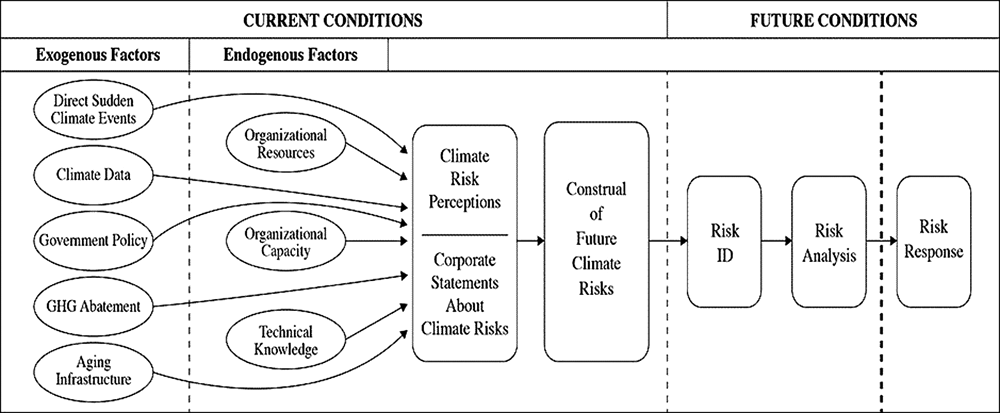Toronto, Edinburgh: Research findings produced as part of a recent PhD dissertation paper “Management cognition of climate risks in the Ontario electricity sector” suggest that power producers cannot plan for climate change due to government policy and regulatory uncertainty. These and other findings were published in December in the Scottish news magazine Panmure House Perspectives.
 Dr. Anna Dowbiggin
The 2018 PhD report, authored by Dr. Anna Dowbiggin of Toronto, was produced after two years of field work where she studied 20 natural gas electricity generators and local utilities as part of her doctoral work with Edinburgh Business School. The report’s conclusions suggest that while climate change impacts are of material risk to power producers, chief executive officers and senior managers of those companies are predominantly concerned with analyzing climate risks rather than with response measures to climate risks.
Dr. Anna Dowbiggin
The 2018 PhD report, authored by Dr. Anna Dowbiggin of Toronto, was produced after two years of field work where she studied 20 natural gas electricity generators and local utilities as part of her doctoral work with Edinburgh Business School. The report’s conclusions suggest that while climate change impacts are of material risk to power producers, chief executive officers and senior managers of those companies are predominantly concerned with analyzing climate risks rather than with response measures to climate risks.
“As a researcher, I wanted to understand how power producers and utilities view the prospects of managing climate risks– with climate risk being understood as something much greater in scope than extreme sudden weather events,” explains Anna Dowbiggin. “Climate risk, as tested in my pilot study, was understood as a range of factors relating to organizational resources, capacity, climate data, aging infrastructure, technical expertise, government policy, greenhouse gas abatement, and yes, sudden extreme weather events. By comparing and switching up all these sources of climate risk – as this group understands it – I was able to unearth over 300 constructs which suggest overall what these groups perceive and are most concerned with.”
 This graphic model shows the conceptual framework of Dr. Dowbiggin’s research study on power producers and utilities. The sector views climate risk as existing in eight impact forms, inside and outside the organization, all driving management perceptions and construal of future climate risks. Managing those climate risks in the future is depicted in the traditional phased approach of risk identification, analysis and response. Interview data produced the greatest number of management perception constructs about climate risk analysis, and much less about how producers and LDCs intended to respond (i.e. mitigation, adaptation, risk transfer) of climate risks in the future. Source: Dowbiggin, A.M. 2018, Climate risk perceptions in the Ontario (Canada) electricity sector, retrieved from www.ros.hw.ac.uk/discover.
According to the research report, power producers and LDCs expressed the greatest concern with government climate policy as the most important factor governing their appraisal of how to handle climate risks in the future. “It’s important to remember how decision makers think of business risks today is likely to influence how they will manage those risks in the future,” according to Dr. Dowbiggin. “The question then becomes how do decision makers construe of the multiple climate risks they face – in assessing the impact they have for managing those risks in the future. If government policy keeps appearing in the data as the strongest driver of business behavior as perceived by these groups, then it’s got to be asked: is government policy a constraint, or is it an enabler of future climate risk management? The suggestion here is that it is a constraint, blocking potential climate risk management practices in the sector.”
This graphic model shows the conceptual framework of Dr. Dowbiggin’s research study on power producers and utilities. The sector views climate risk as existing in eight impact forms, inside and outside the organization, all driving management perceptions and construal of future climate risks. Managing those climate risks in the future is depicted in the traditional phased approach of risk identification, analysis and response. Interview data produced the greatest number of management perception constructs about climate risk analysis, and much less about how producers and LDCs intended to respond (i.e. mitigation, adaptation, risk transfer) of climate risks in the future. Source: Dowbiggin, A.M. 2018, Climate risk perceptions in the Ontario (Canada) electricity sector, retrieved from www.ros.hw.ac.uk/discover.
According to the research report, power producers and LDCs expressed the greatest concern with government climate policy as the most important factor governing their appraisal of how to handle climate risks in the future. “It’s important to remember how decision makers think of business risks today is likely to influence how they will manage those risks in the future,” according to Dr. Dowbiggin. “The question then becomes how do decision makers construe of the multiple climate risks they face – in assessing the impact they have for managing those risks in the future. If government policy keeps appearing in the data as the strongest driver of business behavior as perceived by these groups, then it’s got to be asked: is government policy a constraint, or is it an enabler of future climate risk management? The suggestion here is that it is a constraint, blocking potential climate risk management practices in the sector.”
Comparing the differences in risk perceptions between both groups pointed to another distinction: power producers were more concerned with climate predictive data than utilities, while utilities were more concerned with the physical manifestations of climate risk than power producers. Research findings indicated two other distinctions between the risk perceptions of power producers and LDCs, related to their views on climate risk responses, however limited. Power producers expressed more concerns over ‘going it alone’ as compared to LDCs that viewed climate risk management as a collaborative effort with other market actors.
The second part of Dowbiggin’s PhD research looked at climate risk disclosure practices of the same 20 companies, to see what differences existed between interview data and public reporting data. Her conclusions there suggest that while power producers may discuss a wide variety of climate risk perceptions in person, few if any are disclosed in public documents, a reporting syndrome consistent with many other sectors.
Solutions and recommendations listed in the report called for sector wide collaboration and climate risk management between producers and LDCs, greater transparency in climate risk reporting, better governance and management practices to quantify climate risk impacts and use of emerging global risk practices.
Dr. Anna Dowbiggin is an independent management consultant and an adjunct professor with several Ontario universities. She has worked in corporate development for clients in mining, healthcare, law education and more recently renewable energy development in Ontario. She founded two start-up companies in VOIP communications and a communications group for the medical device industry, and is a member of the Explorers Club of Canada. Her forthcoming book on “Managing Climate Risks: Question Everything” is expected in 2019. She can be reached at
